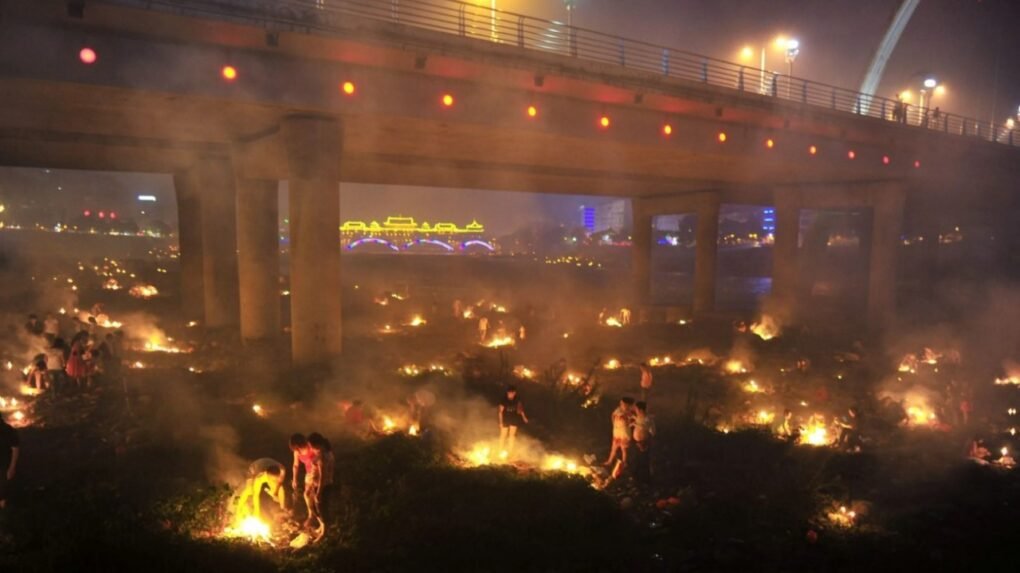
As someone who travels to China frequently, I cannot help but compare cultural aspects, including holidays and events to the ones I grew up with. Recently China celebrated the Hungry Ghost Festival. I was intrigued by the idea of this and did a but of deep diving. While there is much more to this day/month than I could ever explain here, comparing it to the Halloween traditions I grew up with seemed to make for an interesting article.
The Hungry Ghost Festival in China and Halloween in the Western world share quite a few similarities as cultural observances centered around spirits and the supernatural, though they also differ significantly in their origins, practices, and underlying meanings.
The Hungry Ghost Festival, known as “Zhongyuan Festival or Ghost Month”, is deeply rooted in Chinese tradition and Buddhist beliefs. It typically falls on the 15th day of the seventh lunar month and is believed to be a time when the spirits of the deceased are released from the underworld to roam the earth. The festival has a strong focus on ancestor worship and filial piety. Families perform rituals to appease these wandering spirits, offering food, incense, and joss paper (representing money and valuables) to ensure that the spirits are cared for in the afterlife and do not cause harm to the living.
Halloween, celebrated on October 31st, has its origins in the ancient Celtic festival of Samhain, which marked the end of the harvest season and the beginning of winter. It was believed that on this night, the boundary between the living and the dead was blurred, allowing spirits to cross over into the world of the living. Over time, especially with the influence of Christianity, Halloween evolved into a more secular celebration, particularly in the Western world, where it is now largely associated with costumes, trick-or-treating, and festive decorations.
During the Hungry Ghost Festival, rituals are performed to honor and pacify the spirits. Families prepare elaborate meals and set up altars with offerings outside their homes or in temples. In some areas, people float lanterns on rivers to guide lost spirits and perform ceremonies to release souls from suffering. The festival carries a somber tone, with a focus on respect for the deceased and the potential dangers posed by restless spirits. These are also not necessarily done to honor your own relatives but often for those spirits who have no on e to honor or remember them.
In contrast, Halloween is more of a communal and celebratory event. Children dress up in costumes and go door-to-door asking for candy in the tradition of trick-or-treating. Homes and neighborhoods are adorned with spooky decorations, including carved pumpkins (jack-o’-lanterns), and there are often parties and events featuring haunted houses and ghost stories. While Halloween retains some elements of its origins in spirit-related folklore, it is largely a fun and playful holiday, with an emphasis on entertainment rather than spiritual or religious significance.
Both festivals are centered around themes of the supernatural, death, and the spirit world, but they approach these themes from different angles. The Hungry Ghost Festival is deeply spiritual and is about maintaining harmony between the living and the dead. It reflects a belief in the interconnectedness of family, respect for ancestors, and the idea that the living have a responsibility to care for the spirits of the departed.
Halloween, on the other hand, has evolved into a celebration that embraces the eerie and the macabre, often in a light-hearted way. The themes of death and spirits are more about confronting fears in a controlled, playful environment rather than engaging in actual spiritual practices. The symbols of Halloween—ghosts, skeletons, witches—are more about creating an atmosphere of mystery and fun rather than appeasing real spirits.
The Hungry Ghost Festivaland Halloween both offer fascinating insights into how different cultures perceive and interact with the concept of the afterlife and the supernatural. The Hungry Ghost Festival emphasizes reverence, ritual, and the responsibilities of the living towards the dead, rooted in a long tradition of ancestor worship. Halloween, while it also deals with themes of death and spirits, has become a more secular and festive occasion, focusing on fun and community engagement rather than spiritual duty. Despite their differences, both festivals highlight the universal human fascination with the unknown and the unseen, and how these themes are expressed through cultural traditions.
If you want to learn more about The Hungry Ghost Festival check out this brief introduction here.
